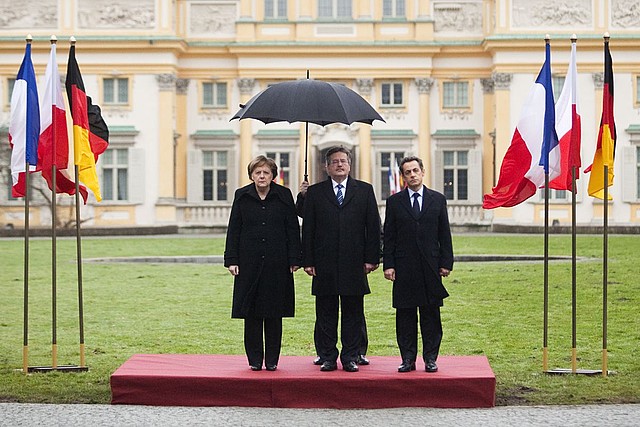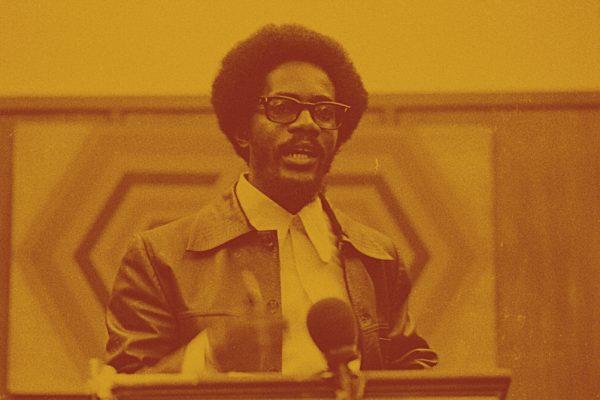Paul Krugman recently wondered whether it was possible to be “both terrified and bored” by the Eurozone crisis. It is indeed terrifying: the EU—the most important political innovation since the invention of the democratic welfare state—might break apart, or worse. Some are predicting the return of large-scale political violence; protesters on the streets of Athens are already comparing Greece, 2011 to Dachau, 1933. But the crisis is also boring, in that a sad pattern has predictably been repeating itself: markets jitter; politicians declare a make-or-break moment; national leaders host an all-night summit; bleary-eyed, they declare the crisis’s final resolution; the market-confidence fairy makes a brief appearance; and then the cycle starts all over again.
By now most people have settled on one of two economic solutions: either let the European Central Bank act as lender of last resort and issue Eurobonds (everyone’s view, it seems, except the German government’s) or impose discipline so as to avoid inflation and a permanent Southern European Mezzogiorno (the official German view).
In the economic debate, however, it is easy to lose sight of the political and, ultimately, moral stakes. While it’s true that much of the business of the EU is business—running a common market—European integration was always first and foremost a political project: its goals included enduring peace, the entrenchment of democracy in member states, and, most recently, moving toward “ever closer union.” The crisis may indeed require Europeans to get serious about political union, at least among the Eurozone countries. But political union will not work without some sense of democratic legitimacy, which the current proposal for tighter cooperation among national executives is unlikely to generate.
Monetary union always had a somewhat unclear relation to the EU’s wider political objectives. Having one currency certainly does not guarantee peace or democracy; think back to the breakup of Yugoslavia, for instance. In theory, monetary union was supposed to have soon been followed by political union. But European elites never explained what political union would be or how it would relate to Europeans’ expectations about democratic government.
What, then, do potential resolutions of the Euro crisis mean for the legitimacy of the EU as a whole? That depends on how one thinks the EU really works and what has made it acceptable to Europeans so far. If one holds, as many European politicians still do, that European integration has proceeded on condition that European nation-states remained “masters of the treaties” (a favorite phrase among German officials), then whatever legitimacy European integration has is derived from the fact that national, directly elected legislatures have voluntarily delegated extensive powers to supranational bodies. According to this view, oversight of the EU through national executives, as well as consensual decision-making by member states, are crucial for reconciling the functional requirements of European integration with popular expectations of legitimate government.
However, the current crisis is likely to stretch any conception of legitimacy based on state-by-state democratic approval. For one thing, executives are completely in the driver’s seat, and parliaments are effectively disempowered. As Kevin O’Rourke has observed, German Chancellor Angela Merkel’s notion of “fiscal union” doesn’t mean coordination of fiscal policies, but—in Orwellian fashion—designates almost the opposite: “fiscal discipline,” oversight by the European Court, and automatic sanctions for violations. Such plans would heavily constrain national legislatures, and curtail a core democratic power: the right of a sovereign legislature to draw up its own budget. None other than the German Constitutional Court has already signaled that automatic fiscal policies might be incompatible with democracy.
Europeans might accept supranational democracy in theory, but cannot see it as part of their lives.
To be sure, national parliaments, whose role had been strengthened in the last major European treaty, retain considerable autonomy and, in particular, continue to decide whether to enlarge bailout funds. But the question remains whether this autonomy is becoming a fiction, when legislatures are browbeaten into following the lead of national executives who proclaim that the very future of Europe is at stake. What happened in Germany is telling in this regard: urgent decisions are now supposed to be taken by a subcommittee of no more than nine national parliamentarians—an emasculation of parliamentary power that is already being challenged before the Constitutional Court.
With EU legitimacy becoming tenuous, this may be the moment for Europeans to take a great leap forward—not into common statehood, but toward the completion of their unique institutional architecture, which can be reduced neither to an intergovernmental organization nor a federal state. Could this finally be Europe’s true constitutional moment, as opposed to the abysmal failure of the EU Constitutional Treaty in France and the Netherlands in 2005?
What precisely would such a new constitutional vision affirm? The “trans-nationalization of popular sovereignty” according to Jürgen Habermas, Europe’s most important public intellectual. Individual European citizens and member states would divide constituent power equally. Indeed Europe’s peculiarity has long been constitutionalism without an overarching state-like structure. The EU has worked because Europeans (or at least the elites) are committed to what constitutional lawyer Joseph Weiler has called “constitutional tolerance” within a broad culture of compromise and consensus. Member states have voluntarily submitted to and advanced EU law, with mutual tolerance for exceptions and even vetoes when they feel their core national interests, constitutional commitments, or, for that matter, their identities are in danger. Habermas’s project aims to take violence out of politics without creating the nightmare of a world state. Most recently, Habermas has insisted that European nation-states and individual European citizens ought to understand themselves as the “co-original” authors of a European constitution.
At first sight, recent summits seem to confirm the special nature of the EU. After all, the United Kingdom just used its veto to protect its national interest, which apparently can be reduced to protecting London’s finance industry. But fiscal union without the United Kingdom might forever remain an ad hoc treaty among nation-states legally separate from the EU. On the other hand, a core Europe committed to fiscal discipline might eventually take on the features of a federal state, though it could also remain stuck in the mode of what Habermas has criticized as a “federalism of executives,” chafing under austerity and lacking any connection to democratic publics. Parallel treaties could render the whole European public order incoherent.
The right answer to the crisis, from the point of view of democratic theory, is far from clear. One position calls for reinforcing nation-state–based legitimacy, while at the same time restricting the freedom of nation-states. By contrast, seeking a grand constitutional bargain, with meaningful participation from European publics, seems preferable. But much will depend on the details, and smaller member states are unlikely to be happy with even a more democratic Europe, which they equate with being outvoted by the more populous countries. In fact, what might look like a real continent-wide democracy on paper could exacerbate what the legal theorist Peter Lindseth calls the “democratic disconnect” in Europe: people might accept supranational democracy in theory, but cannot see it as part of their lives, let alone conceive of themselves as its authors.
Neither futurology nor Brusselology—a worthy contemporary successor to Kremlinology—are plausible sciences. Still, one might hazard a guess. One of two scenarios might unfold. First, treaties establishing fiscal union will prove as ineffective as those enforcing fiscal discipline. The estrangement of the United Kingdom might then turn out to be only the first in a series of divorces, with the EU family eventually becoming completely dysfunctional or reduced to the core of the core. Alternatively, Europeans might come to see the crisis as the moment when they were forced to realize what has been true for some time: they really share each others’ fate. Such recognition will not translate immediately into a pan-European welfare state; the special nature of the EU could well remain political union without overarching statehood. But Europeans might ultimately push harder for true fiscal integration, which could include a genuine European treasury, perhaps initiated with the help of a German government less wedded to neoliberal doctrines; tougher financial regulation; and a new constitutional architecture of which both member states and individual citizens could conceive themselves as authors.







